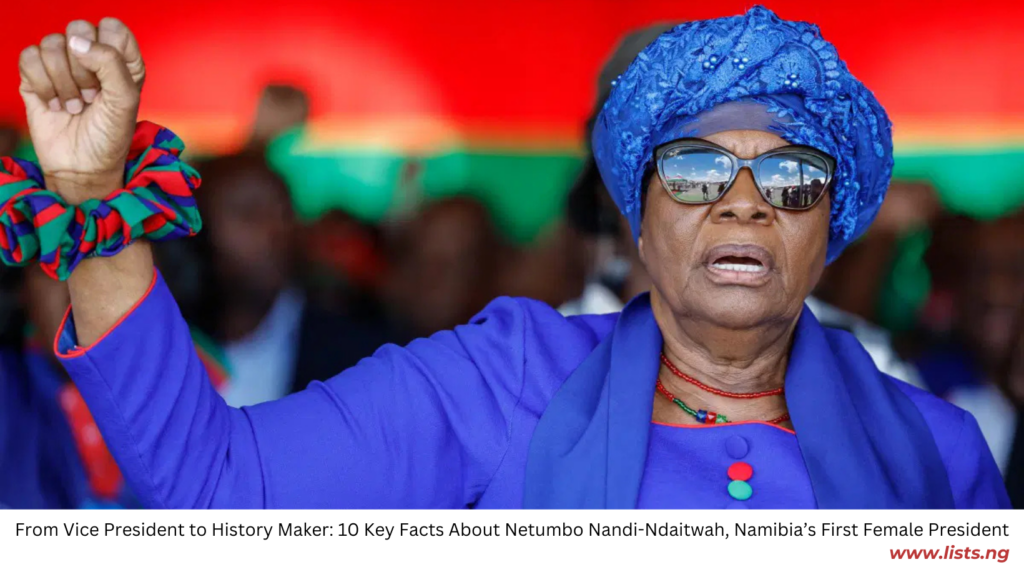In a historic turn of events, Namibia has elected its first female president, Netumbo Nandi-Ndaitwah, marking a significant milestone in African leadership. While women have steadily risen in politics across the continent, female presidents remain rare, and Nandi-Ndaitwah’s victory is a remarkable achievement.
Here are 10 key facts about her journey and what it means for Namibia and Africa at large:
- A Legacy of Firsts
At 72, Nandi-Ndaitwah becomes not only Namibia’s fifth president since independence but also the first woman to hold the nation’s highest office. Her leadership breaks a deeply ingrained cultural norm, setting a powerful example for women across Africa.
- A Symbol of Stability Amid Controversy
Despite a contentious election marred by technical glitches and legal challenges, Nandi-Ndaitwah emerged with 57% of the vote, avoiding a runoff and cementing her place in history. Her win represents a vote for stability in one of Africa’s most peaceful democracies.
- An Independence Heroine
Nandi-Ndaitwah’s political journey began during Namibia’s independence struggle. A member of the underground movement against apartheid rule, her roots in the fight for freedom lend her a symbolic connection to Namibia’s liberation history.
- Internationally Educated Leader
Her global perspective was shaped by education in the then-Soviet Union. This international exposure provided her with the tools to navigate Namibia’s post-independence development and build relationships on the world stage.
- SWAPO’s Resilient Leader
Nandi-Ndaitwah has been a prominent figure in SWAPO, Namibia’s ruling party since independence. Despite losing ground in parliamentary elections, the party secured a thin majority, and her leadership is seen as pivotal in preserving its legacy of governance.
- A Rising Tide of Female Leadership in Africa
Although still rare, women are increasingly breaking through barriers to assume presidential roles in Africa. With her election, Nandi-Ndaitwah joins a select group of female leaders on the continent, including Samia Suluhu Hassan of Tanzania.
- Economic Challenges Await
Namibia faces high unemployment, economic disparities, and untapped natural resources. Nandi-Ndaitwah campaigned on promises of youth empowerment and economic reform, critical issues she must tackle to address growing frustrations among the country’s youth.
- Opposition Pressure and Electoral Criticism
Her victory isn’t without controversy. Opposition parties have questioned the legitimacy of the election, pledging to challenge its outcome. These tensions underscore the delicate balance she must maintain to unite the nation.
- Historic Regional Context
Nandi-Ndaitwah’s win comes at a time when long-standing ruling parties in southern Africa are losing their grip. Unlike Botswana’s and South Africa’s ruling parties, which have seen significant losses, SWAPO narrowly maintained power. Her leadership will determine if SWAPO can adapt to changing political landscapes.
- A Vision for Peace and Progress
In her victory speech, she emphasized peace, stability, and youth empowerment, echoing her commitment to addressing Namibia’s challenges. Her leadership promises a blend of historical wisdom and a forward-looking agenda for her country.
Final Thoughts
In a continent where tradition often defines leadership, her success marks a pivotal shift toward inclusivity and representation. As Namibia embarks on this new chapter, the world watches with anticipation to see how she will steer the country forward.



